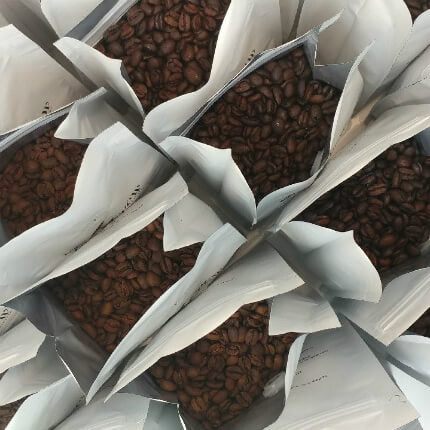Keeping your coffee fresh – what you need to know.

One of the trademarks of specialty coffee is its quality, and with that comes a higher price tag on each bag. Let’s make your investment enjoyable to the very last drop!
For most people coffee is a staple in their diet and they probably consider it a non-perishable item. It’s easy to think that when you see shelves full of canned coffee in a center isle at the grocery store. However, coffee is an agricultural product - it’s a fruit with a limited shelf life, and while it doesn’t get moldy, like say strawberries, it does go stale.
Coffee has four enemies: air, heat, light, and moisture.
AIR – Perhaps enemy #1 of coffee is oxygen. When roasted beans are exposed to air, they can go bad in just a matter of days. When beans oxidize the taste begins to degrade. (Oxidation is when the coffee combines with oxygen and begins to break down chemically – much like bread left out on the counter will become hard and stale.)
HEAT - The reason exposure to heat isn’t good for roasted coffee is because heat allows for faster molecule movement and that increases the rate in which the oils evaporate, which leads to loss of flavor.
LIGHT – Similar to the affects from air, light, specifically ultra violet light causes a break-down of the bean’s structure allowing it to go stale very quickly.
MOISTURE – Moisture, usually from condensation, pushes the oils that are inside the bean to the surface. Those oils begin to degrade and become rancid.
How to combat coffee’s enemies.
Roasters know that freshly roasted coffee should be bagged immediately into opaque, air-tight bags, however, fresh roasted coffee releases carbon dioxide which will expand the bags until they burst. One-way degassing valves allow for the CO₂ to escape out, but do not let air in. Most bags now have these. Coffee that is sold in bags without them, such as brown craft bags, will be compromised.
Store your coffee in a cool place like a pantry away from your oven or other heat sources. If you keep your coffee on the counter, be sure it inadvertently doesn’t sit in a warm, sunny spot.
If you purchased your coffee in an opaque bag that is airtight, keep it in there! If it didn’t come in a bag like that, you definitely want to transfer it into a different container. However tempting it may be to store your coffee in a decorative clear jar (because coffee is cool to look at) DON’T! Even if that jar is airtight, remember that light isn’t good for it. Choose a container that is air-tight and not see-through.
Lastly, do not store your coffee in the refrigerator or freezer. This causes condensation on the beans. Instead of making it last longer, storing it this way actually makes it go stale quicker. Since the cell structure of coffee is soft and porous, it not only absorbs moisture, but also odors and other flavors – such as any and all leftovers in the frig, another reason to not store it there.
Here at Talking Crow, we’ve chosen a bag with you in mind. It’s opaque, with a one-way degassing valve and zipper closure to keep the air out and freshness in.
A limited shelf life
As soon as coffee beans are roasted they start expelling carbon dioxide, known as degassing. For optimal flavor, coffee is best when left to sit a day or two after roasting allowing for the coffee to rest. Madcap Coffee, a well-known roaster out of Michigan, likens it to a good steak that needs to sit. They also suggest that the time needed for coffee to degas depends on the brewing method. For both filter-brewed coffee and French press, it is best to let it rest for one to two days and enjoyed within three to ten days after roasting, while espresso is best when rested five days and brewed within five to twelve days.
Since roasted coffee is only at peak freshness for about three to four weeks, it is smart to buy smaller quantities of freshly roasted coffee more frequently. In other words, don’t stock up.
Whole bean vs. ground.
Once the bean has been cracked via grinding, oils are released, oxidation happens and the coffee goes stale rather quickly. Because of this, it is best to buy whole bean coffee and grind it just before use. Did you know that once coffee is ground it has about a 30 minute life-span?!
For home brewing, we personally use this espresso machine. We like that it has an integrated conical burr grinder, which lets us grind immediately before extracting for amazing espresso. When we are in the mood for a pour-over or French press, we like this one.
How does Talking Crow store coffee? We store our green beans in jute bags that are lined with grain-pro bags, which protect against insects, moisture, and oxidation. These bags are stored in our climate controlled roaster where we monitor temperature and humidity. In order to provide you with the freshest beans possible, we only roast when you order and ship them to you the very next day.
Quality and honesty/transparency are important to us. That's why we date stamp our bags with the roast date. This allows you to know the exact day the beans were roasted and be ensured of their freshness.